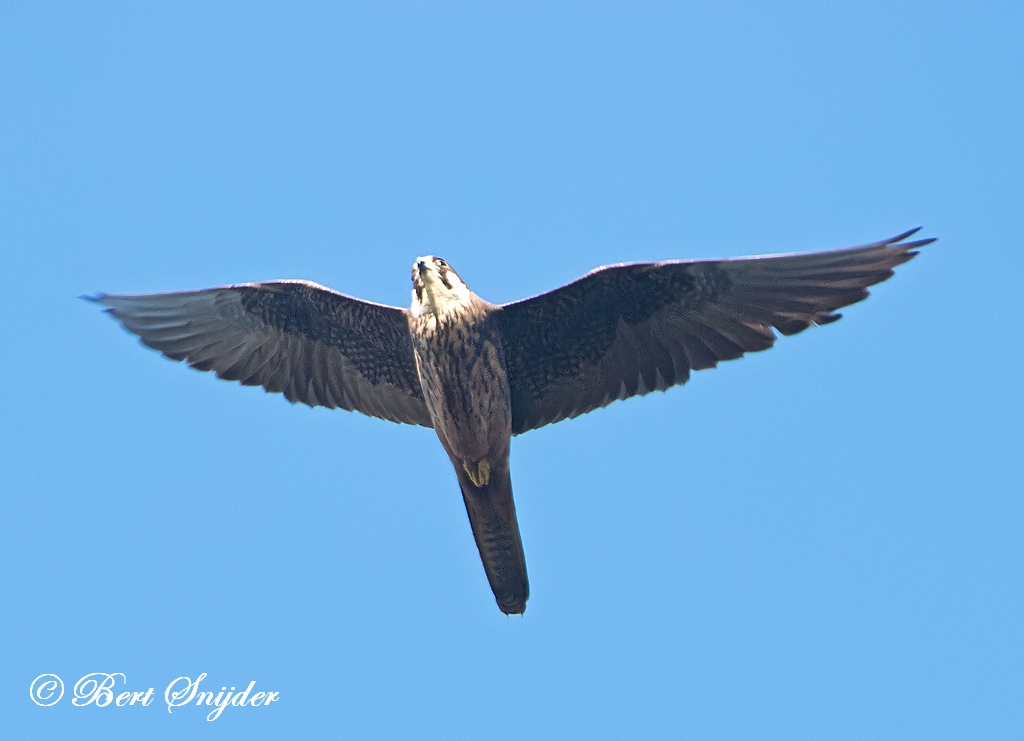Eleonora’s Falcon, Eleonora´s Valk, Eleonorenfalke, Falcão-da-rainha, Halcón de Eleonora
Spotted in the Alentejo region of Portugal. Eleonora’s Falcon sound
Eleonora’s falcon (Falco eleonorae) is a medium-sized falcon. It belongs to the hobby group, a rather close-knit number of similar falcons often considered a subgenus Hypotriorchis. The sooty falcon is sometimes considered its closest relative, but while they certainly belong to the same lineage, they do not seem to be close sister species. Eleonora’s falcon is named after Eleanor of Arborea, Queen (Juighissa) and national heroine of Sardinia, who granted for the first time in history the protection of bird nests against illegal hunters in 1392 under the jurisdiction conferred by the Carta de Logu. The genus name falco is from Late Latin falx, falcis, a sickle, referring to the claws of the bird. The species name eleonorae again commemorates the Sardinian Eleanor of Arborea, who passed a law protecting nesting hawks and falcons.

Eleonora’s falcon is an elegant bird of prey, 36–42 cm (14–17 in) long with an 87–104 cm (34–41 in) wingspan. It is shaped like a large Eurasian hobby or a small slender peregrine falcon, with its long pointed wings, long tail and slim body. There are two colour morphs: The adult dark morph is all sooty brown, with black underwing coverts. The light morph is more like a juvenile Eurasian hobby, but has buff underparts, and also shows the contrast between the black underwing coverts and paler base to the flight feathers. Young birds are also like a large juvenile hobby, but the pale underparts contrast with darker wingtips and wing coverts. The call is a typical falcon kek-kek-kek.
This species breeds on islands in the Mediterranean particularly off Greece (where two-thirds of the world’s population breeds), but also in Cyprus, the Canary Islands, Ibiza and off Spain, Italy, Croatia, Morocco and Algeria. Tilos Park is the breeding area for 10% of the world population of Eleonora’s falcons. Six hundred and fifty pairs of this species breed on this island according to research conducted by the Hellenic Ornithological Society and the European Union LIFE-Nature program of Tilos. It is rare as a vagrant north of its range.It also lives on the coast of Madagascar and Mozambique.
Other synonyms:
Afrikaans: Eleonoravalk
Bulgarian: Средиземноморски сокол
Catalan: Falcó de la reina, Falcó d’Eleonor, Falcó marí
Catalan (Balears): Falcó marí
Czech: ostøíž jižní, Ostríž jižní, Ostříž jižní
Welsh: Hebog Eleonora
Danish: Eleonorafalk
German: Eleonorenfalke
Greek: Μαυρομμάτης, Μαυροπετρίτης
Greek (Cypriot): Μαυρομμάτης
English: Eleonara’s Falcon, Eleonora Falcon, Eleonora’s Falcon
English (Kenya): Eleonora’s Falcon
Spanish: Halcón de Eleonor, Halcón de Eleonora
Spanish (Spain): Halcón de Eleonora
Estonian: vahemere pistrik
Basque: Eleonor belatza, Falcó de la reina
Finnish: Välimerenhaukka
French: Faucon d’Éléonore, Faucon d’Eléonore, Faucon d’Éléonore
Galician: Falcó de la reina, Falcón da raíña
Hebrew: בז חופים
Croatian: Elenorin sokol
Hungarian: Eleonóra-sólyom
Armenian: Էլեոնորայի բազե
Icelandic: Eyfálki
Italian: Falco della regina
Japanese: ereonorahayabusa
Japanese: エレオノラハヤブサ
Georgian: ელეონორას შავარდენი
Latin: Falco eleonorae
Lithuanian: Akmeninis sakalas, Eleonoros sakalas
Latvian: Eleonoras piekūns
Malagasy: Firasambalala, tsikoza
Macedonian: медитерански сокол, Средоземноморски (Скалест) сокол
Maltese: Bies tar-Regina, Bies tar-Reġina
Dutch: Eleonora’s Valk, Eleonora-valk
Norwegian: Eleonorafalk, Eleonoraflk, Leonorafalk
Polish: Kobuz skalny, sokól skalny, Sokół skalny
Portuguese: falcão da rainha, Falcão-da-rainha
Portuguese (Portugal): Falcão-da-rainha
Romanian: Şoim mediteranean
Russian: Алет, Или Алет, Сокол Элеоноры, чеглок Элеоноры
Slovak: sokol ostrovný, sokol ostrovný (sokol južný)
Slovenian: sredozemski sokol
Albanian: Skifteri mbretëror
Serbian: Morski soko, mrki soko, Мрки (Приморски) соко
Swedish: Eleonorafalk
Swahili: Kozi wa Eleonora
Turkish: Ada Doğanı, ada doğany, Ada Doşanı, Elenor Doğanı
Chinese: 艾氏隼
Chinese (Traditional): 埃歐諾拉氏隼
Birders Birdwatching Holiday in the Alentejo region of Portugal, Individual guided tours, trips, excursions and birding holiday.